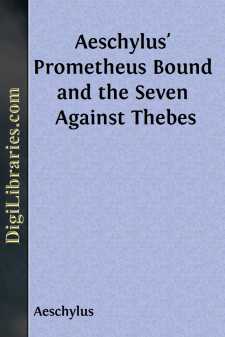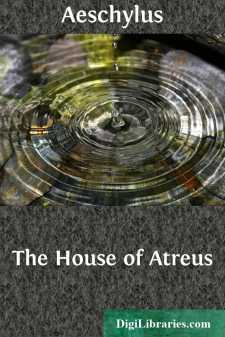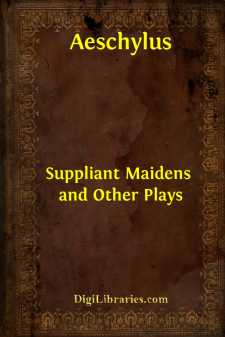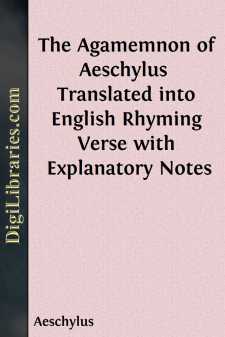Categories
- Antiques & Collectibles 13
- Architecture 36
- Art 48
- Bibles 22
- Biography & Autobiography 813
- Body, Mind & Spirit 142
- Business & Economics 28
- Children's Books 17
- Children's Fiction 14
- Computers 4
- Cooking 94
- Crafts & Hobbies 4
- Drama 346
- Education 46
- Family & Relationships 57
- Fiction 11829
- Games 19
- Gardening 17
- Health & Fitness 34
- History 1377
- House & Home 1
- Humor 147
- Juvenile Fiction 1873
- Juvenile Nonfiction 202
- Language Arts & Disciplines 88
- Law 16
- Literary Collections 686
- Literary Criticism 179
- Mathematics 13
- Medical 41
- Music 40
- Nature 179
- Non-Classifiable 1768
- Performing Arts 7
- Periodicals 1453
- Philosophy 64
- Photography 2
- Poetry 896
- Political Science 203
- Psychology 42
- Reference 154
- Religion 513
- Science 126
- Self-Help 84
- Social Science 81
- Sports & Recreation 34
- Study Aids 3
- Technology & Engineering 59
- Transportation 23
- Travel 463
- True Crime 29
Aeschylus
Aeschylus was an ancient Greek playwright, often considered the father of tragedy, who lived from 525/524 to 456/455 BCE. He is best known for introducing a second actor into performances, which expanded the potential for dramatic dialogue and conflict. Among his surviving works are "The Oresteia" trilogy, which includes "Agamemnon," "The Libation Bearers," and "The Eumenides." His plays often explored themes of justice, divine intervention, and the human condition, profoundly shaping the future of Western drama.
Author's Books:
Sort by:
by:
Aeschylus
INTRODUCTION. Æschylus, the first of the great Grecian writers of tragedy, was born at Eleusis, in 525 B.C. He was the son of Euphorion, who was probably a wealthy owner of rich vineyards. The poet's early employment was to watch the grapes and protect them from the ravages of men and other animals, and it is said that this occupation led to the development of his dramatic genius. It is more easy...
more...
by:
Aeschylus
_INTRODUCTORY NOTE Of the life of Aeschylus, the first of the three great masters of Greek tragedy, only a very meager outline has come down to us. He was born at Eleusis, near Athens, B. C. 525, the son of Euphorion. Before he was twenty-five he began to compete for the tragic prize, but did not win a victory for twelve years. He spent two periods of years in Sicily, where he died in 456, killed, it...
more...
by:
Aeschylus
DEDICATION Take thou this gift from out the grave of Time. The urns of Greece lie shattered, and the cup That for Athenian lips the Muses filled, And flowery crowns that on Athenian hair Hid the cicala, freedom's golden sign, Dust in the dust have fallen. Calmly sad, The marble dead upon Athenian tombs Speak from their eyes "Farewell": and well have fared They...
more...
by:
Aeschylus
PREFACE The sense of difficulty, and indeed of awe, with which a scholar approaches the task of translating the Agamemnon depends directly on its greatness as poetry. It is in part a matter of diction. The language of Aeschylus is an extraordinary thing, the syntax stiff and simple, the vocabulary obscure, unexpected, and steeped in splendour. Its peculiarities cannot be disregarded, or the translation...
more...





